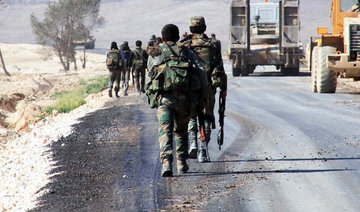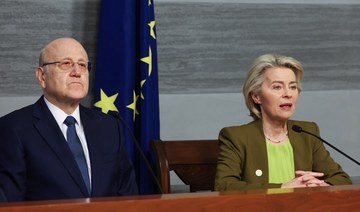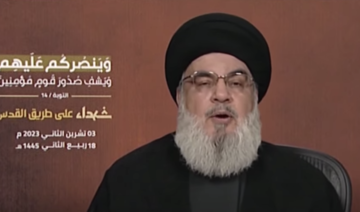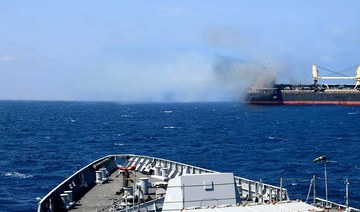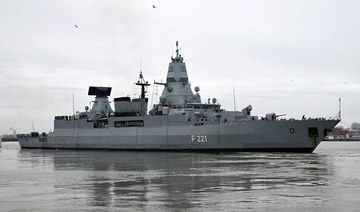NEW YORK: Vigorous prosecutions of Hezbollah’s drug traffickers and other vice units could starve the Iran-backed militia of cash and hurt its military activities in the Middle East, an expert on the group told Arab News.
Emanuele Ottolenghi, a fellow at the Foundation for Defense of Democracies, a think tank, praised this week’s decision by the United States to launch a task force to probe “narcoterrorism” by the Lebanese movement Hezbollah.
The group pockets $200-$300 million each year – 20-30 percent of its annual budget – from smuggling cocaine to the US and other illicit schemes before using the cash to fund activities in Syria, Lebanon and Yemen, Ottolenghi said.
“You could severely disrupt flows of funds that come through Hezbollah’s Latin American involvement to their war machine in the Middle East,” said Ottolenghi, the author of several books on Iran and its Shiite proxy militia.
“You could weaken them at the global level – impairing their ability to interface with the cartels, logistically being able to carry out terrorist strikes abroad, and reduce their leverage in Lebanon, which is contingent on their financial largesse.”
Ottolenghi’s comments followed Thursday’s decision by the US Justice Department to create a unit of specialists on money-laundering, drug trafficking, terrorism and organized crime aimed at Hezbollah’s fund-raising wing.
Attorney General Jeff Sessions said it would “leave no stone unturned” in targeting Hezbollah’s sprawling network, whose reach extends across Africa and into Central and South America, according to the department.
The team will build prosecutions, disrupt drug rings and staunch cash flows, Sessions said. He noted criticism that former president Barack Obama held back from cracking down on Hezbollah’s global web in order to achieve the 2015 nuclear deal with Iran.
The creation of the Hezbollah Financing and Narcoterrorism Team (HFNT) comes amid a stepped-up effort to battle Iran’s growing influence in the Middle East and the group’s expanded military capabilities.
Senator Roger Wicker, a Mississippi Republican, praised the new HFNT, saying an “aggressive, multi-agency investigation” of Hezbollah was “sorely needed” and thanked President Donald Trump’s administration for delivering.
“The Iran-backed Hezbollah uses its criminal network to fund ongoing efforts that undermine US interests. Obama officials blocked efforts to take the terrorist group down,” Wicker said via Twitter on Thursday.
“The American people and their representatives in Congress require a full assessment of Hezbollah’s criminal enterprises.”
Wicker and other Republicans have bashed Obama following a report in Politico in December that his administration hindered a Drug Enforcement Administration (DEA) program targeting Hezbollah’s trafficking operations as it brokered the 2015 Iran nuclear deal.
Washington has long targeted Hezbollah with sanctions, accusing the group of terrorist attacks and destabilizing parts of the Middle East using resources gained through global drug smuggling and money laundering operations.
In 2011 the Obama administration cracked down on the group’s far-flung associates, branding Beirut-based Lebanese Canadian Bank a “primary money laundering concern” for handling the funds of alleged Hezbollah drugs chief Ayman Joumaa.
The US Treasury and DEA later described a massive operation involving Panama- and Colombia-based drug traffickers shipping multi-ton amounts of cocaine to the US, Europe and elsewhere around the globe.
The network laundered billions of dollars of their own cash and that of other traffickers through Panama shell companies, various banks in Lebanon and elsewhere, and an operation that exported used cars from the US to West Africa.
Former DEA official Derek Maltz said Hezbollah most recently used the proceeds to buy weapons for the group’s operations in Syria, and some funds went to Yemen, where Iran-backed rebels are battling Saudi-supported government forces.
Against this backdrop, Ottolenghi warned that the new HFNT faced a formidable task and would need talent, tools and the full diplomatic clout of the Trump administration to make a dent in Hezbollah’s criminal web.
“You’re dealing with a global network of people who are very loyal to one another, are loyal to the cause, and often benefit from great wealth for themselves personally and for the enterprise,” Ottolenghi told Arab News.
“They are talented, multilingual gangster-cum-entrepreneurs who travel seamlessly across borders and have global connections for support and cover. In short, we need talent, resources and the lowering of bureaucratic barriers that have impeded the government from doing the right thing until now.”
US prosecution drive could weaken Hezbollah in Mideast
US prosecution drive could weaken Hezbollah in Mideast

US doesn’t believe ‘genocide’ occurring in Gaza: White House

- White House National Security Adviser Jake Sullivan insisted that the responsibility for peace lay with Hamas
- Biden has come under fire from Republicans for halting some weapons shipments
WASHINGTON DC: The United States does not believe that genocide is occurring in Gaza but Israel must do more to protect Palestinian civilians, President Joe Biden’s top national security official said Monday.
As ceasefire talks stall and Israel continued striking the southern city of Rafah, White House National Security Adviser Jake Sullivan insisted that the responsibility for peace lay with militant group Hamas.
“We believe Israel can and must do more to ensure the protection and wellbeing of innocent civilians. We do not believe what is happening in Gaza is a genocide,” Sullivan told a briefing.
The US was “using the internationally accepted term for genocide, which includes a focus on intent” to reach this assessment, Sullivan added.
Biden wanted to see Hamas defeated but realized that Palestinian civilians were in “hell,” Sullivan said.
Sullivan said he was coming to the White House podium to “take a step back” and set out the Biden administration’s position on the conflict, amid criticism from both ends of the US political spectrum.
Biden has come under fire from Republicans for halting some weapons shipments to press his demands that Israel hold off a Rafah offensive, while there have been protests at US universities against his support for Israel.
The US president believed any Rafah operation “has got to be connected to a strategic endgame that also answered the question, ‘what comes next?’” Sullivan added.
This would avoid Israel “getting mired in a counterinsurgency campaign that never ends, and ultimately saps Israel’s strength and vitality.”
First international UN staff member killed in Gaza attack

- Guterres “was deeply saddened to learn of the death of a UN DSS staff member and injury to another DSS staffer when their UN vehicle was struck,” spokesperson said
- “The Secretary-General condemns all attacks on UN personnel and calls for a full investigation,” Haq said
UNITED NATIONS: A UN security services member was killed in an attack on a vehicle in Gaza on Monday, a spokesperson said, adding the death was the first international UN employee killed in the Palestinian territory since the war began.
UN chief Antonio Guterres “was deeply saddened to learn of the death of a United Nations Department of Safety and Security (DSS) staff member and injury to another DSS staffer when their UN vehicle was struck as they traveled to the European Hospital in Rafah,” said his deputy spokesperson Farhan Haq.
It was “the first international casualty” for the UN since the start of the Israeli offensive in Gaza in retaliation for the Hamas attack of October 7, Haq said, recalling that some 190 Palestinian UN employees have been killed, mainly staff of the UN Palestinian Refugee Agency (UNRWA).
“The Secretary-General condemns all attacks on UN personnel and calls for a full investigation,” Haq said.
The spokesman did not immediately release the nationality of the person killed.
“I don’t have the full details of whether this was part of a large convoy or not, I believe it was in a convoy that was moving, and this was the DSS vehicle that was hit,” he said.
The DSS oversees the security of UN agencies and programs in more than 130 countries around the world.
Hezbollah chief urges Beirut to allow Syrian migrant boats to leave for Europe

- Hassan Nasrallah called for ‘a national decision that says: we have opened the sea... whoever wants to leave for Europe, for Cyprus, the sea is in front of you. Take a boat and board it’
- Cyprus, the EU’s easternmost member, is less than 200 kilometers (125 miles) from Lebanon and Syria, and wants to curb migrant boat departures from Lebanon toward its shores
BEIRUT: Hezbollah chief Hassan Nasrallah on Monday urged Lebanese authorities to open the seas for migrant boats to reach Europe, amid soaring anti-Syrian sentiment and accusations the West is seeking to keep refugees in Lebanon.
His remarks came in an apparent bid to pressure the European Union after it announced earlier this month $1 billion in aid to Lebanon to help tackle irregular migration.
Many in crisis-hit Lebanon have criticized the aid package as focused on preventing refugees from leaving the country, amid mounting calls for them to return home.
In a televised address, Nasrallah called for “a national decision that says: we have opened the sea... whoever wants to leave for Europe, for Cyprus, the sea is in front of you. Take a boat and board it.”
But “we do not propose forcing displaced Syrians to board boats and leave for Cyprus and Europe,” he added in the speech, broadcast on the group’s Al-Manar television channel.
Cyprus, the EU’s easternmost member, is less than 200 kilometers (125 miles) from Lebanon and Syria, and wants to curb migrant boat departures from Lebanon toward its shores.
Currently refugees “are prohibited (from leaving), and so they turn to smuggling and to rubber boats, and there are drownings in the sea, because the Lebanese army is implementing a political decision to stop them from migrating,” Nasrallah added.
Lebanon says it currently hosts around two million people from neighboring Syria — the world’s highest number of refugees per capita — with almost 785,000 registered with the United Nations.
Lebanon needs to tell the West that “we all have to coordinate with the Syrian government to return the displaced to Syria and to present them with aid there,” Nasrallah said.
He also urged Lebanon’s parliament to press the EU and Washington to lift sanctions on Syria that Damascus says are blocking aid and reconstruction efforts, adding: “If sanctions on Syria aren’t lifted, there will be no return” of refugees.
Nasrallah’s remarks came a day before Lebanon is expected to resume “voluntary returns” of Syrians, with dozens of families set to pass through two land border crossings in the country’s east, a year and a half after such returns were paused.
Lebanon’s economy collapsed in late 2019, turning it into a launchpad for migrants, with Lebanese joining Syrians and Palestinian refugees making perilous Europe-bound voyages.
Some Lebanese politicians have blamed Syrians for their country’s worsening troubles, and pressure often mounts ahead of an annual conference on Syria in Brussels, with ministers meeting this year on May 27.
Rights groups including Amnesty International and Human Rights Watch have warned that Syria is not safe for returns.
No pollution from ship hit by Houthis in Red Sea, Yemeni minister says

- A Yemeni government official told Arab News on Monday that the UN team, made up of experts from various UN bodies, informed the Aden-based Yemeni government that rescuing the ship was “impossible”
AL-MUKALLA: Yemen’s Water and Environment Minister Tawfeeq Al-Sharjabi said his ministry found no signs of pollution from a ship filled with fertilizer and gasoline that sunk in the Red Sea.
“No leakage has come from the vessel yet, although it remains an environmental concern at all times,” the Yemeni minister told Arab News. He urged the world to assist the war-torn country in recovering the vessel.
In February, Yemen’s Houthi militia fired missiles at the Belize-flagged and Lebanese-operated MV Rubymar, which was carrying 22,000 tonnes of ammonium phosphate-sulfate NPS fertilizer and more than 200 tonnes of fuel while sailing in the Red Sea, severely damaging it and causing a large oil slick in the sea.
The ship eventually sank, prompting warnings from authorities as well as local and international environmentalists that the ship’s cargo could seep into the water or explode.
The Houthi attack on the ship was part of a larger operation targeting naval and commercial ships in the Red Sea, Bab Al-Mandab Strait and the Gulf of Aden, which the Yemeni militia claims is in support of the Palestinians.
At the same time, a UN team that examined the sinking ship in March concluded that it could not be recovered owing to the expense and a lack of equipment, suggesting that the ship be left to sink.
A Yemeni government official told Arab News on Monday that the UN team, made up of experts from various UN bodies, informed the Aden-based Yemeni government that rescuing the ship was “impossible” and advised the Yemeni government to continue monitoring the ship via a remotely operated vehicle, as well as the country’s coastline for signs of pollution.
“The UN team said that they hoped the ship would sink to the bottom of the sea and that the leaking would occur in stages, allowing the fertilizer to disintegrate and causing no harm. Their primary fear is that the leak may occur in a single day,” a Yemeni government official said, adding that recovering the ship would be more difficult the deeper it sank.
As for the ship’s fuel load, the UN team believed that it would not do much harm if it spilled into the water gradually, but they did not rule out the option of sucking it from the ship via pipes, the Yemeni official said.
Meanwhile, the US Central Command said that its forces on Sunday shot down a drone over the Gulf of Aden that was launched by the Houthis from regions under their control. The Houthis have not claimed credit for the new wave of drones and ballistic missiles intercepted by the US-led maritime coalition in the Red Sea since Thursday.
This comes as the EU mission in the Red Sea, known as Eunavfor Aspides, said on Monday that a Dutch warship, HNLMS Karel Doorman, has joined its fleet of ships in the Red Sea to safeguard commercial ships against Houthi attacks.
“We thank the Netherlands for their swift and precious contribution. EUNAVFOR ASPIDES is getting stronger,” the EU mission said in a post on X.
Turkiye’s Erdogan hosts Greek PM, sees ‘no unsolvable problems’ in bilateral ties

- “Despite disagreements, we focus on a positive agenda by keeping our dialogue channels open,” Erdogan said
- “We showed today that alongside our proven disagreements, we can chart a parallel page of agreements,” Mitsotakis said
ANKARA/ATHENS: Turkish President Tayyip Erdogan told Greek Prime Minister Kyriakos Mitsotakis during talks in Ankara on Monday that there were “no unsolvable problems” between their countries.
Turkiye and Greece, NATO allies and historic foes, have long been at odds over issues including maritime boundaries, energy resources in the eastern Mediterranean, flights over the Aegean Sea, and ethnically split Cyprus.
After years of tensions that brought the two to the brink of conflict, they have started taking high-profile steps to improve ties, especially since both leaders were re-elected last year.
“Despite disagreements, we focus on a positive agenda by keeping our dialogue channels open,” Erdogan told a joint press conference with Mitsotakis.
Mitsotakis said the leaders’ frequent meetings in recent months had “proved that we neighbors can establish an approach of mutual understanding, not as an exception but as a productive normality.”
“We showed today that alongside our proven disagreements, we can chart a parallel page of agreements,” he added.
Erdogan visited Athens last December and the two countries signed the “Declaration of Athens” aimed at setting the base for a roadmap to rebooting relations.
They agreed to boost trade, keep communication channels open, carry out military confidence-building measures to reduce tensions, and work on problems that have kept them apart.
The two leaders disagreed over how to classify the Palestinian militant group Hamas. Erdogan reiterated his view that it is a “resistance movement” and said he was saddened by the Greek view — shared by many other Western countries — that it is a terrorist organization.
“Let’s agree to disagree,” Mitsotakis replied.
“Unprecedented heights”
On Sunday, Mitsotakis told Turkish daily Milliyet that his visit to Ankara — the first in five years — was an opportunity to evaluate progress and to reiterate Athens’ commitment to improving ties.
Erdogan, speaking to Greek daily Kathimerini on Sunday, said the main goal was to “raise the level of our bilateral relations to unprecedented heights,” adding the neighbors had many issues they could agree on while seeking solutions to their problems.
However, the allies remain at loggerheads over several issues including maritime jurisdiction.
Greece’s plan to build a marine park in the Aegean, which it says is for environmental purposes, has upset Turkiye, while Athens was annoyed by Turkiye’s decision to turn the ancient Chora church, previously a museum for decades, into a mosque.


